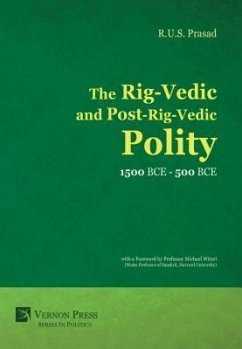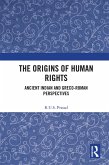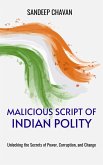The book critically examines and assesses the literary evidence available through Vedic and allied literature portraying the nature of Vedic polity, the functionalities of its various institutions, and the various social and religious practices. The book is not a narrative but critically examines the nature of changes in a host of these areas that occurred at each stage of Vedic polity from early Vedic period to post R¿ig-Vedic period. It outlines in historical perspective the various stages involved in the development of Vedic polity and Vedic canon and how the two processes have gone along together. It contains extensive discussions on political system and institutions, religious and social practices as they obtained during the Rig-Vedic and post Rig-Vedic periods. It provides a fresh approach to the cult of sacrifice and fire rituals practiced by Vedic Aryans along with an in-depth analysis of the Vedic view of Nationalism, Sovereignty and State as discernible from Vedic texts .The book also features an extensive discussion on the institution of kingship, administrative machinery, role of various entities in the polity including the Purohita, the Sabha and the Samiti, position of women, Varna system and features of tribal kingdoms, such as the Kuru-Panchalas and Kosala-Videhas. Isolating political and social aspects from the essentially religious character of Vedic literature, an attempt has been made to show with due corroboration that the tribal polity was not deficient in political content contrary to the stance of some scholars to depict Vedic Aryans as apolitical and inward looking.
The present book partakes both the current and previous scholarship on the subject but breaks a new path with its exclusive focus on the Rig-Vedic and Post Rig-Vedic polity, together with a balanced and objective assessment of their features. It brings all the relevant and connected issues on to one platform, and deals with them in a holistic manner. Its unique features include:
• The "Vedic Grid": a graphical representation and tabulations of the characteristics of each of the about 50 Vedic tribes, including information on the location of their habitat, their time line, the names of their chieftains and their linkage with priestly clans. • A special focus on the Second Urbanization taking place in the Gangetic valley between the 6th and 4th centuries BCE. It explains how towards the end of the later Vedic period, the polity underwent a change in political, social and economic spheres which blossomed later during the period of Mauryas. • Two appendices dealing with the theories of Aryan migration and the relationship of the Vedic Aryans with the Harappa culture and what can be ascertained by Vedic literature.
The present book partakes both the current and previous scholarship on the subject but breaks a new path with its exclusive focus on the Rig-Vedic and Post Rig-Vedic polity, together with a balanced and objective assessment of their features. It brings all the relevant and connected issues on to one platform, and deals with them in a holistic manner. Its unique features include:
• The "Vedic Grid": a graphical representation and tabulations of the characteristics of each of the about 50 Vedic tribes, including information on the location of their habitat, their time line, the names of their chieftains and their linkage with priestly clans. • A special focus on the Second Urbanization taking place in the Gangetic valley between the 6th and 4th centuries BCE. It explains how towards the end of the later Vedic period, the polity underwent a change in political, social and economic spheres which blossomed later during the period of Mauryas. • Two appendices dealing with the theories of Aryan migration and the relationship of the Vedic Aryans with the Harappa culture and what can be ascertained by Vedic literature.
Dieser Download kann aus rechtlichen Gründen nur mit Rechnungsadresse in A, D ausgeliefert werden.









